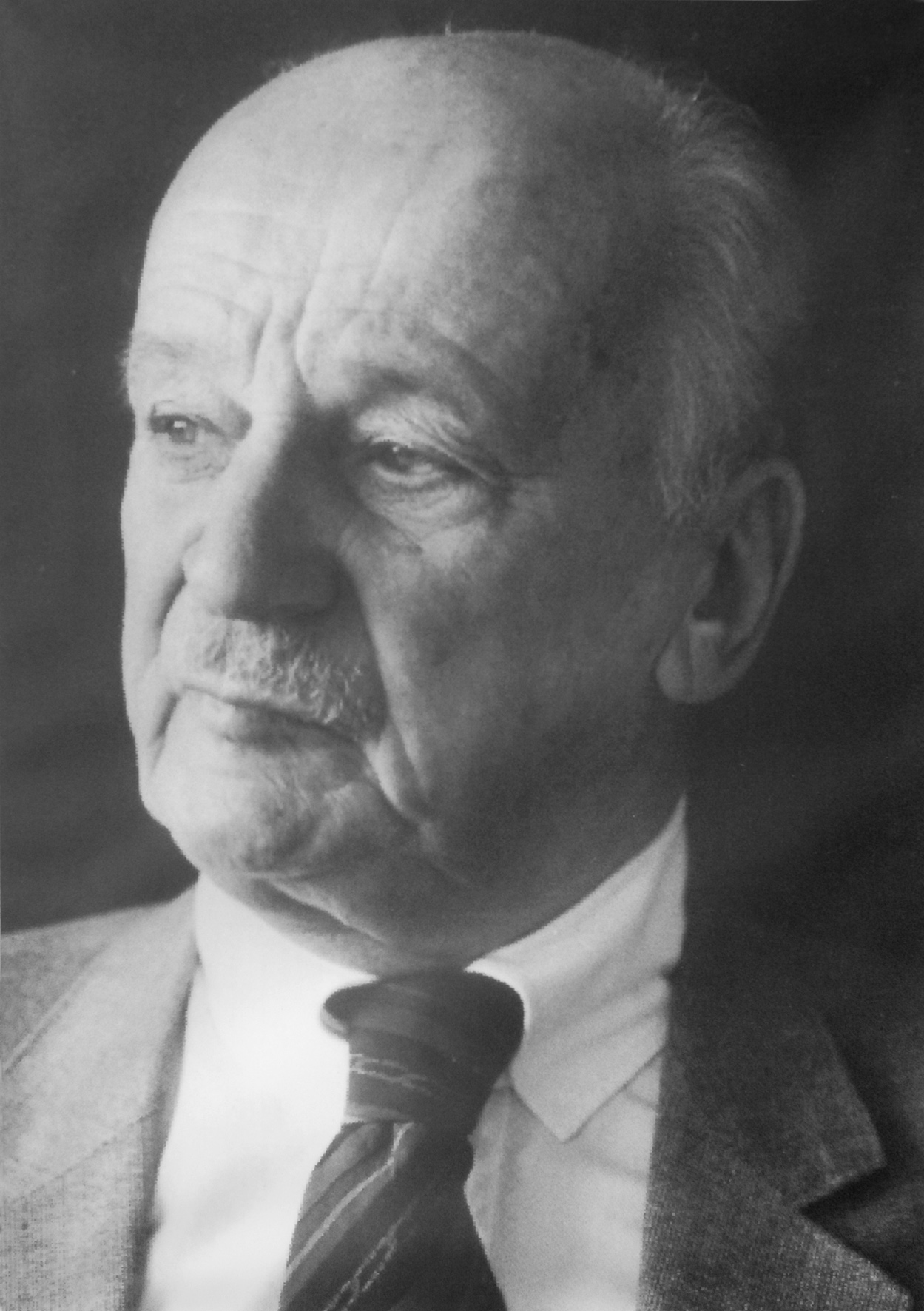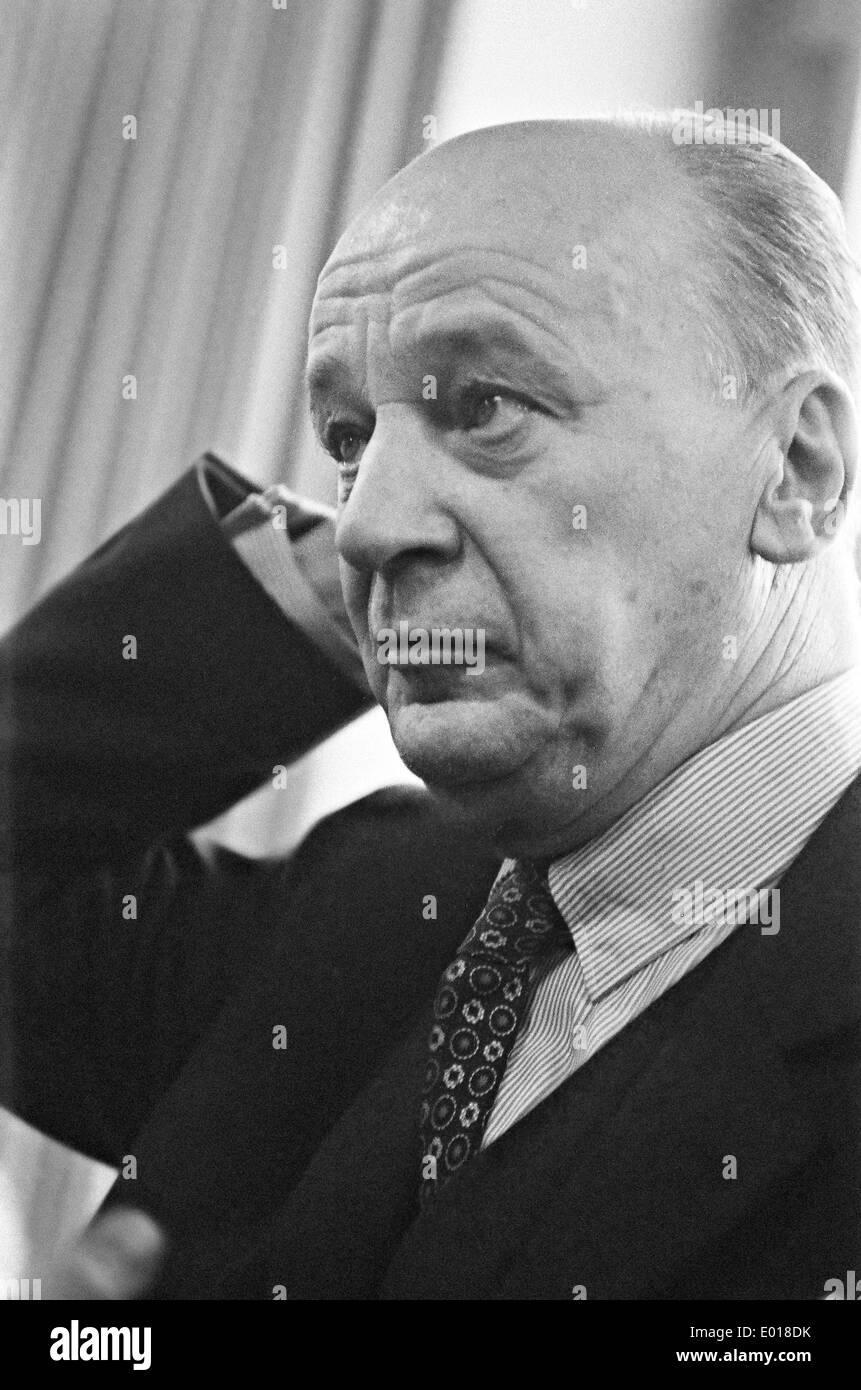Dolf Sternberger
Dolf Sternberger (actually Adolf Sternberger, born July 28, 1907 in Wiesbaden, † July 27, 1989 in Frankfurt am Main ) was a German political scientist and journalist.
Sternberger is considered one of the founders of the German political science after the Second World War. He is one next to Hannah Arendt, Leo Strauss, Eric Voegelin and other political scientists of his generation in the wider sense of the representatives of the normative approach in political science, he at the same time also understood as an empirical science ( Bird, 2008). With a contribution to the 30th anniversary of the adoption of the Basic Law (1979 ) Sternberger coined the term constitutional patriotism.
Life
Sternberger studied from 1925 theater studies and German philology at the universities of Kiel and Frankfurt. In 1927 he moved to the University of Heidelberg and visited philosophical, sociological and art historical events. His doctorate was completed Sternberger 1931 with Paul Tillich in Frankfurt with a thesis on Martin Heidegger's Being and Time.
Sternberger was a freelancer since 1927, from 1934 until its ban in 1943 editor of the Frankfurter Zeitung. Sternberger, who himself was married to a Jewess, used in the suspiciously regarded by the Nazis in a newspaper designated by him as "hidden writing ": for example, he described the destruction of the Jews with the fable of the wolf and the lamb.
Between 1945 and 1948 he wrote in collaboration with Gerhard Storz and William E. Süskind articles for the monthly magazine The conversion, which he had co-founded, and he served as its editor ( with the assistance of Karl Jaspers, Werner Krauss and Alfred Weber). In 1957, the contributions were first published under the title From the Dictionary of inhumanity in book form. The articles examine based on 28 terms, the language of the Nazis, who acts up to the present time. Sternberger wrote in his preface to the edition of 1957: " ... The Dictionary of inhumanity is the dictionary of the German language remained in force, ...". It can be found, inter alia, comments on the following words (or their specific orientation, so their misuse or use under National Socialism ): concerns, orientation, mentoring, in character, conduct, genuine, unique, use, women's work, shaping out to be, intellectual, cultural workers, warehouse, in terms of performance, girl, human treatment, organizing, problem, Propaganda, cross fire, space, training, sector, portable, intolerable, agents, know current events. In the third edition of 1967, the dictionary contained 33 terms: girl was taken out, order, hardness, contacts, people, resentment among others have been added. see dehumanization
After the Second World War Sternberger in 1945 government spokesman Middle Rhine -Saar. He was from 1950 to 1958, the magazine The presence out. Sternberger was a commentator for the Hessischer Rundfunk and wrote editorials for the Frankfurter Allgemeine Zeitung.
1947 took over Sternberger a lecturer in politics at the University of Heidelberg, since 1951, he built a research group in this field on. 1960 he was appointed extraordinary, in 1962 ordinary professor. Sternberger founded the Political Quarterly (PVS ), the official journal of the German Association of Political Science ( DVPW ). Sternberger was 1961-1963 Chairman of the DVPW and took over in the course of his life numerous other honorary positions in science and culture. After the dissolution of the Christian-Liberal coalition, he called together with Richard Freudenberg on November 9, 1966 in an appeal to the members of parliament to form a grand coalition for the purpose of introducing the relative majority voting.
Sternberger's concept of the political
As co-founder of the German Political Science is Sternberger also expressed his own opinion, this was what the political. So is especially Sternberger's "Heidelberg inaugural lecture " as the primary document on this issue. He said: " The object and aim of the policy is peace. The political need and we want to understand try to ensure as the range of efforts to restore peace, to preserve peace, protect, and of course also to defend. Or, in other words: peace is the political category par excellence. Or, again, in other words: peace is the reason and the characteristic and the norm of the political, all this at the same time. "
Honors
1989 Dolf Sternberger was honored with the Order of Merit Grand Cross in the stage. Sternberger is immortalized on the Frankfurt stairs. 1974 Sternberger was awarded the German Critics Prize and the Grand Cross of Merit. In 1981 he received the Wilhelm- Heinse Medal and 1985 the Ernst Bloch Prize.
Dolf Sternberger price
Established in 1990, Dolf Sternberger Society Foundation awards since 1992 at irregular intervals a " Dolf Sternberger Award" for contributions to the " connection between politics and language" .. Previous winners are Willy Brandt (1992 ), Martin Walser ( 1994), Wolfgang Schäuble ( 1996), Manfred Rommel (1998 ), Joachim Gauck (2000 ), Helmut Schmidt (2002 ), Friedrich Merz (2006), Václav Havel (2007) and Norbert Lammert (2010).
Writings
- Writings. Insel Verlag, Frankfurt, 1977 (12 So far volumes) including Volume 4 State Friendship, with an essay: The sunken city. About Hannah Arendt's idea of politics.
- Reprints: island, Frankfurt 1981, ISBN 3-458-04785-9










